-
 Bitcoin
Bitcoin $113900
-1.39% -
 Ethereum
Ethereum $3517
-4.15% -
 XRP
XRP $3.009
1.59% -
 Tether USDt
Tether USDt $0.9997
-0.04% -
 BNB
BNB $766.8
-1.41% -
 Solana
Solana $164.6
-2.38% -
 USDC
USDC $0.9998
-0.02% -
 TRON
TRON $0.3277
0.65% -
 Dogecoin
Dogecoin $0.2023
-1.67% -
 Cardano
Cardano $0.7246
0.05% -
 Hyperliquid
Hyperliquid $38.27
-4.77% -
 Sui
Sui $3.528
-0.52% -
 Stellar
Stellar $0.3890
-0.73% -
 Chainlink
Chainlink $16.16
-2.69% -
 Bitcoin Cash
Bitcoin Cash $539.9
-4.38% -
 Hedera
Hedera $0.2425
-2.00% -
 Avalanche
Avalanche $21.71
-0.97% -
 Toncoin
Toncoin $3.662
5.73% -
 Ethena USDe
Ethena USDe $1.000
-0.02% -
 UNUS SED LEO
UNUS SED LEO $8.964
0.35% -
 Litecoin
Litecoin $107.7
2.33% -
 Shiba Inu
Shiba Inu $0.00001223
-0.40% -
 Polkadot
Polkadot $3.617
-0.97% -
 Uniswap
Uniswap $9.052
-2.49% -
 Monero
Monero $295.1
-3.79% -
 Dai
Dai $0.9999
0.00% -
 Bitget Token
Bitget Token $4.315
-1.85% -
 Pepe
Pepe $0.00001060
0.11% -
 Cronos
Cronos $0.1342
-2.72% -
 Aave
Aave $256.0
-0.87%
How to get Bitcoin without spending money? 9 ways to get it for free
You can get Bitcoin for free through faucets, referrals, airdrops, mining, staking, gaming, content creation, bounties, and trading competitions.
Jun 06, 2025 at 08:35 am
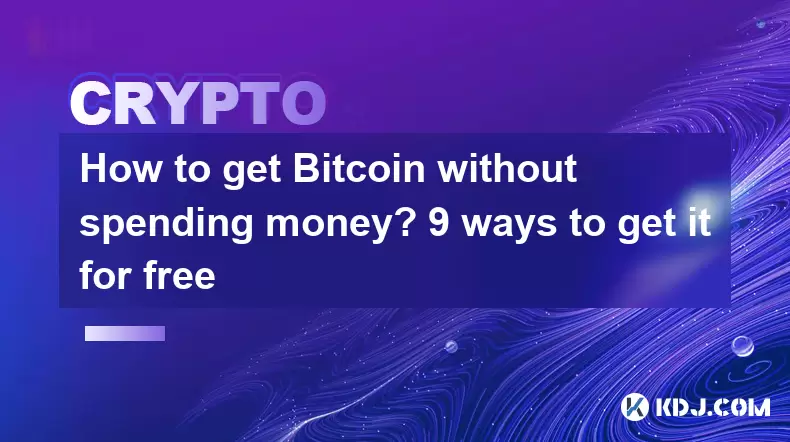
How to Get Bitcoin Without Spending Money? 9 Ways to Get It for Free
In the world of cryptocurrencies, Bitcoin stands as the pioneer and the most recognized digital currency. While many people purchase Bitcoin with fiat money, there are several ways to acquire Bitcoin without spending any money. This article explores 9 effective methods to get Bitcoin for free, providing detailed steps and insights for each approach.
Faucets: Claiming Small Amounts of Bitcoin
Bitcoin faucets are websites that reward users with small amounts of Bitcoin for completing simple tasks. These tasks often involve solving captchas, watching ads, or participating in surveys.
- Choose a reputable faucet: Start by researching and selecting a well-reviewed Bitcoin faucet. Websites like FreeBitco.in and Cointiply are popular choices.
- Create an account: Sign up for an account on the faucet website. You will need to provide an email address and set up a password.
- Complete tasks: Engage in the tasks provided by the faucet. These can range from viewing advertisements to solving puzzles.
- Claim your Bitcoin: After completing tasks, you can claim your Bitcoin. The amount is usually very small, often measured in satoshis (the smallest unit of Bitcoin).
- Withdraw your earnings: Once you accumulate a sufficient amount, you can withdraw your Bitcoin to a wallet of your choice. Be aware of the minimum withdrawal thresholds set by the faucet.
Referral Programs: Earning Through Invitations
Many cryptocurrency platforms offer referral programs that reward users for inviting new members. By sharing your unique referral link, you can earn a portion of the Bitcoin earned or spent by the people you refer.
- Find a platform with a referral program: Look for cryptocurrency exchanges or wallets that offer referral bonuses. Coinbase and Binance are examples of platforms with such programs.
- Generate your referral link: Once you have an account, generate your unique referral link from the platform's referral section.
- Share your link: Spread your referral link through social media, forums, or personal contacts. The more people who sign up using your link, the more Bitcoin you can earn.
- Track your earnings: Monitor your referral earnings through the platform's dashboard. Earnings are typically credited automatically once the referred users complete certain actions.
Airdrops: Receiving Free Tokens
Airdrops are events where new cryptocurrency projects distribute free tokens to users. Sometimes, these tokens can be traded for Bitcoin.
- Stay updated on upcoming airdrops: Follow cryptocurrency news websites and social media channels to stay informed about upcoming airdrops.
- Participate in airdrops: To participate, you usually need to sign up on the project's website and provide a wallet address where the tokens will be sent.
- Complete any required tasks: Some airdrops require you to complete tasks such as joining a Telegram group or retweeting a post.
- Convert your tokens to Bitcoin: Once you receive the tokens, you can trade them for Bitcoin on a cryptocurrency exchange.
Mining: Using Your Computer's Power
Bitcoin mining involves using your computer's processing power to solve complex mathematical problems, which helps to secure the Bitcoin network. In return, miners are rewarded with Bitcoin.
- Choose mining software: Select a reliable mining software such as CGMiner or EasyMiner.
- Join a mining pool: Mining solo is often not profitable for individual users. Joining a mining pool increases your chances of earning Bitcoin more consistently.
- Set up your mining rig: Configure your mining software to connect to the mining pool. Ensure your computer or mining rig is optimized for mining.
- Start mining: Begin mining and monitor your progress. Earnings will depend on the hash rate of your equipment and the current difficulty level of the Bitcoin network.
Staking: Earning Bitcoin Through Holding
Staking involves holding cryptocurrencies in a wallet to support the operations of a blockchain network. Some platforms offer Bitcoin rewards for staking certain cryptocurrencies.
- Choose a staking platform: Research platforms that offer Bitcoin rewards for staking. Examples include platforms like Crypto.com and KuCoin.
- Select a cryptocurrency to stake: Choose a cryptocurrency that you want to stake. Make sure it is supported by the platform and offers Bitcoin rewards.
- Deposit your cryptocurrency: Transfer the chosen cryptocurrency to your staking wallet on the platform.
- Start staking: Begin staking and earn Bitcoin rewards based on the amount staked and the platform's reward structure.
Playing Games: Earning Bitcoin Through Gaming
Some online games offer Bitcoin as a reward for playing and achieving certain milestones. These games can range from simple mobile apps to more complex browser-based games.
- Find a game that offers Bitcoin rewards: Research and select a game that rewards players with Bitcoin. Examples include RollerCoin and Bitcoin Alien.
- Create an account: Sign up for an account on the game's website or app.
- Play the game: Engage in the gameplay and complete tasks or achieve milestones to earn Bitcoin.
- Withdraw your earnings: Once you have accumulated a sufficient amount of Bitcoin, you can withdraw it to your wallet. Be aware of any minimum withdrawal limits.
Content Creation: Earning Through Blogs and Videos
Creating content about Bitcoin and cryptocurrencies can attract sponsorships, donations, or ad revenue in Bitcoin.
- Choose your content platform: Decide whether you want to create blog posts, YouTube videos, or content on other platforms.
- Create valuable content: Produce high-quality content that provides value to your audience. Topics can include Bitcoin news, tutorials, or investment advice.
- Monetize your content: Use platforms like Patreon for donations, set up a Bitcoin tip jar, or join ad networks that pay in Bitcoin.
- Promote your content: Share your content on social media and relevant forums to attract more viewers and potential sponsors.
Bounty Programs: Completing Tasks for Rewards
Bounty programs are initiatives by cryptocurrency projects to reward users for completing specific tasks. These tasks can range from bug reporting to social media promotion.
- Find a bounty program: Look for cryptocurrency projects that offer bounty programs. Platforms like Bounty0x and Bounties Network list various bounties.
- Select a task: Choose a task that matches your skills and interests. Tasks can include writing articles, translating content, or testing software.
- Complete the task: Follow the instructions provided by the project to complete the task. Ensure you meet all the requirements.
- Submit your work: Submit your completed task to the project's designated submission channel. Once approved, you will receive your Bitcoin reward.
Trading Competitions: Winning Bitcoin Through Skill
Some cryptocurrency exchanges host trading competitions where participants can win Bitcoin based on their trading performance.
- Find a trading competition: Research cryptocurrency exchanges that host trading competitions. Examples include Bybit and BitMEX.
- Register for the competition: Sign up for the competition through the exchange's platform. You may need to deposit a small amount of cryptocurrency to participate.
- Trade strategically: Use your trading skills to maximize your returns during the competition period. Follow market trends and use technical analysis to make informed trades.
- Claim your winnings: If you rank high enough in the competition, you will be awarded Bitcoin based on the prize structure.
Frequently Asked Questions
Q1: Are there any risks associated with using Bitcoin faucets?
A1: Yes, there are risks associated with Bitcoin faucets. Some faucets may be scams designed to steal your personal information or infect your device with malware. Always use reputable faucets and protect your personal information.
Q2: Can I really earn significant amounts of Bitcoin through these methods?
A2: While it is possible to earn Bitcoin through these methods, the amounts are typically small. Earning significant amounts of Bitcoin for free requires a lot of time and effort, and the returns may not always justify the time invested.
Q3: Do I need any special equipment to start Bitcoin mining?
A3: For Bitcoin mining, you will need specialized hardware known as ASICs (Application-Specific Integrated Circuits). These devices are designed specifically for mining and are more efficient than regular computers.
Q4: How can I ensure the safety of my Bitcoin earnings?
A4: To ensure the safety of your Bitcoin earnings, use a reputable and secure wallet, enable two-factor authentication on your accounts, and never share your private keys or seed phrases with anyone. Regularly update your software and be cautious of phishing attempts.
Disclaimer:info@kdj.com
The information provided is not trading advice. kdj.com does not assume any responsibility for any investments made based on the information provided in this article. Cryptocurrencies are highly volatile and it is highly recommended that you invest with caution after thorough research!
If you believe that the content used on this website infringes your copyright, please contact us immediately (info@kdj.com) and we will delete it promptly.
- Worldcoin, Identity, WLD Price: Decoding the NYC Crypto Buzz
- 2025-08-02 21:10:12
- Shiba Inu: Utility and Community Strength Drive Crypto's Evolution
- 2025-08-02 21:50:12
- Crypto Donations, Trump PAC, and Bitcoin: A New York Minute on Political Coin
- 2025-08-02 20:30:12
- Crypto Market Under Pressure: Bearish Momentum and Rising Volatility Take Hold
- 2025-08-02 20:30:12
- Crypto Market Carnage: Liquidations Soar as Ethereum and Bitcoin Take a Beating
- 2025-08-02 21:55:12
- DeFi Token Summer Gains: Is Mutuum Finance the Real Deal?
- 2025-08-02 18:30:12
Related knowledge
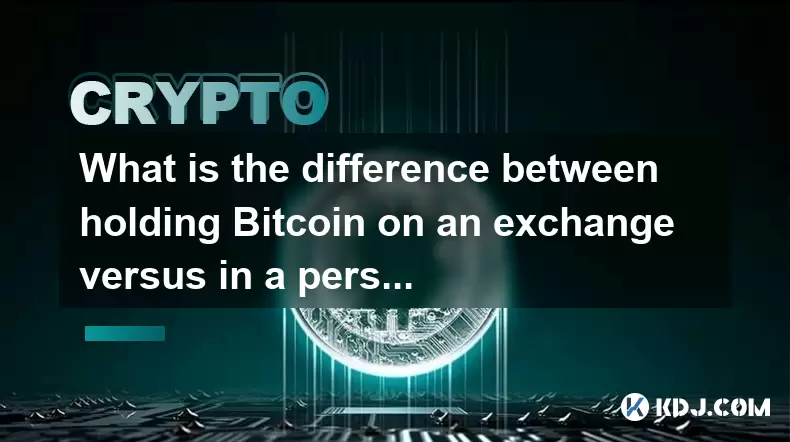
What is the difference between holding Bitcoin on an exchange versus in a personal wallet?
Aug 02,2025 at 03:15pm
Understanding Custodial vs Non-Custodial ControlWhen holding Bitcoin on an exchange, users are essentially entrusting their assets to a third party. E...
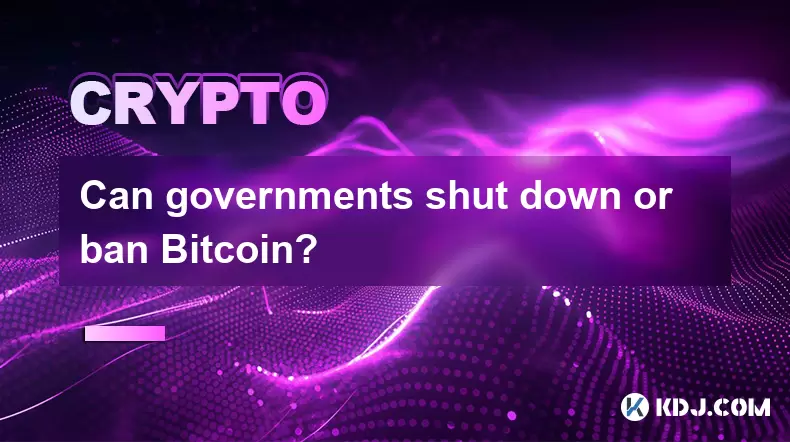
Can governments shut down or ban Bitcoin?
Aug 02,2025 at 09:44am
Understanding Bitcoin’s Decentralized StructureBitcoin operates on a decentralized peer-to-peer network, meaning it is not controlled by any single en...
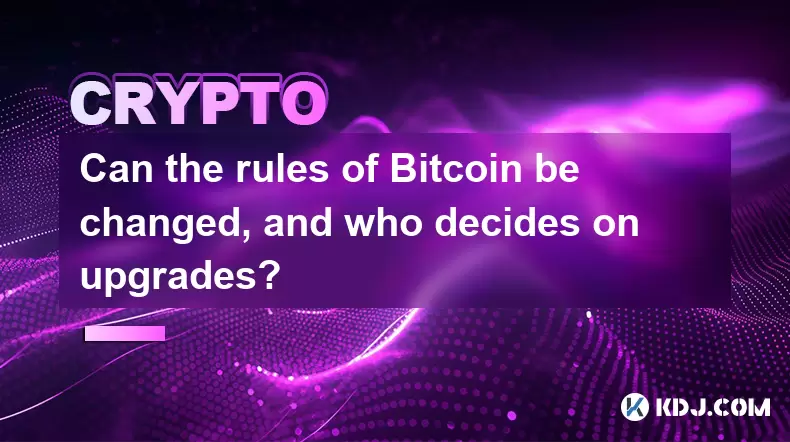
Can the rules of Bitcoin be changed, and who decides on upgrades?
Aug 02,2025 at 06:36am
Understanding Bitcoin's Governance ModelBitcoin operates without a central authority, which means no single entity has the power to unilaterally chang...
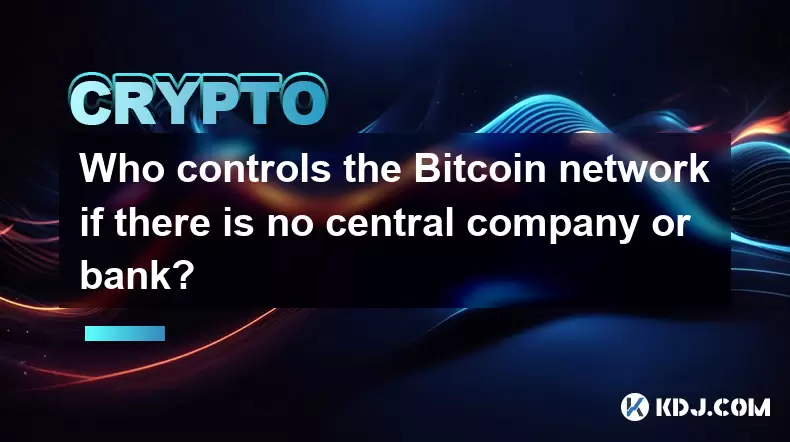
Who controls the Bitcoin network if there is no central company or bank?
Aug 02,2025 at 06:01pm
Understanding Decentralized Control in BitcoinThe Bitcoin network operates without a central authority, which raises the question of who controls it. ...
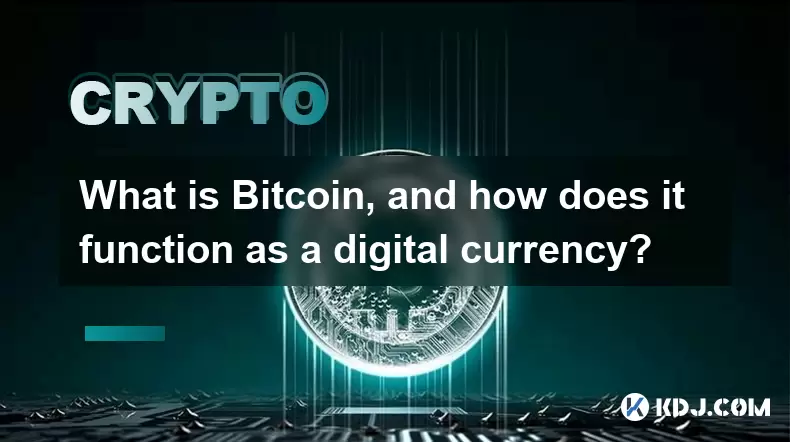
What is Bitcoin, and how does it function as a digital currency?
Aug 02,2025 at 04:01am
Understanding Bitcoin as a Digital CurrencyBitcoin is a decentralized digital currency that operates without the need for a central authority such as ...
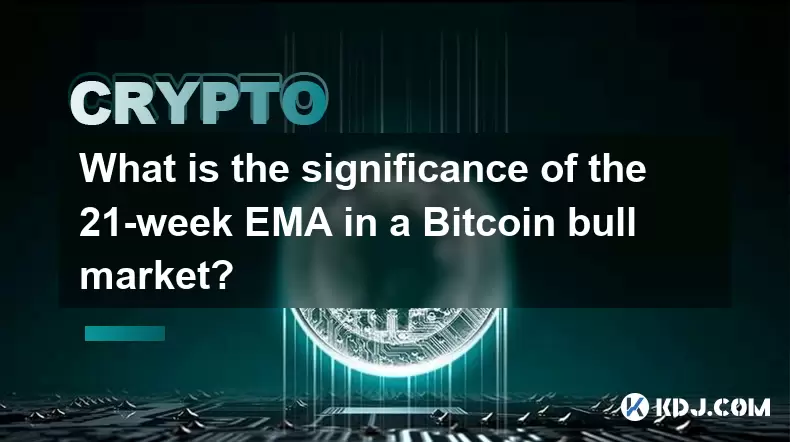
What is the significance of the 21-week EMA in a Bitcoin bull market?
Jul 10,2025 at 06:56pm
Understanding the 21-Week EMA in Cryptocurrency AnalysisThe 21-week Exponential Moving Average (EMA) is a technical indicator widely used by traders a...

What is the difference between holding Bitcoin on an exchange versus in a personal wallet?
Aug 02,2025 at 03:15pm
Understanding Custodial vs Non-Custodial ControlWhen holding Bitcoin on an exchange, users are essentially entrusting their assets to a third party. E...

Can governments shut down or ban Bitcoin?
Aug 02,2025 at 09:44am
Understanding Bitcoin’s Decentralized StructureBitcoin operates on a decentralized peer-to-peer network, meaning it is not controlled by any single en...

Can the rules of Bitcoin be changed, and who decides on upgrades?
Aug 02,2025 at 06:36am
Understanding Bitcoin's Governance ModelBitcoin operates without a central authority, which means no single entity has the power to unilaterally chang...

Who controls the Bitcoin network if there is no central company or bank?
Aug 02,2025 at 06:01pm
Understanding Decentralized Control in BitcoinThe Bitcoin network operates without a central authority, which raises the question of who controls it. ...

What is Bitcoin, and how does it function as a digital currency?
Aug 02,2025 at 04:01am
Understanding Bitcoin as a Digital CurrencyBitcoin is a decentralized digital currency that operates without the need for a central authority such as ...

What is the significance of the 21-week EMA in a Bitcoin bull market?
Jul 10,2025 at 06:56pm
Understanding the 21-Week EMA in Cryptocurrency AnalysisThe 21-week Exponential Moving Average (EMA) is a technical indicator widely used by traders a...
See all articles

























































































